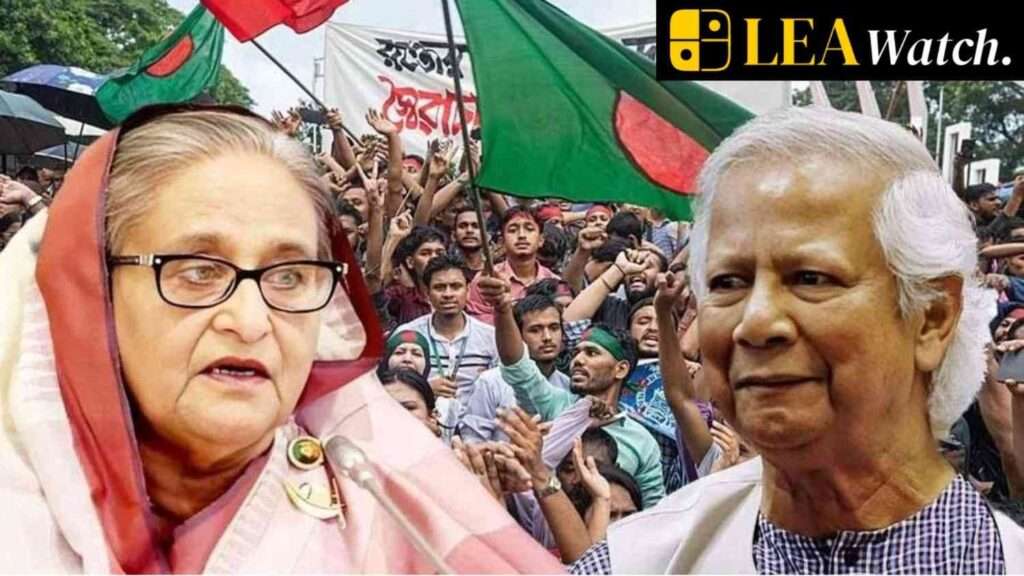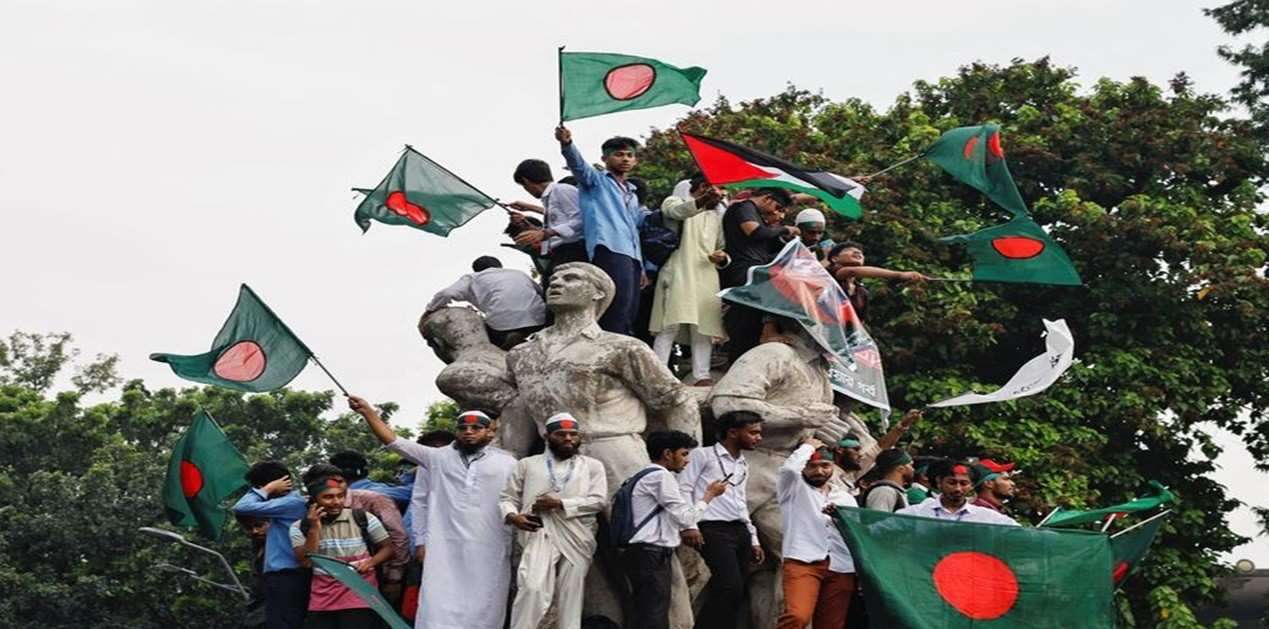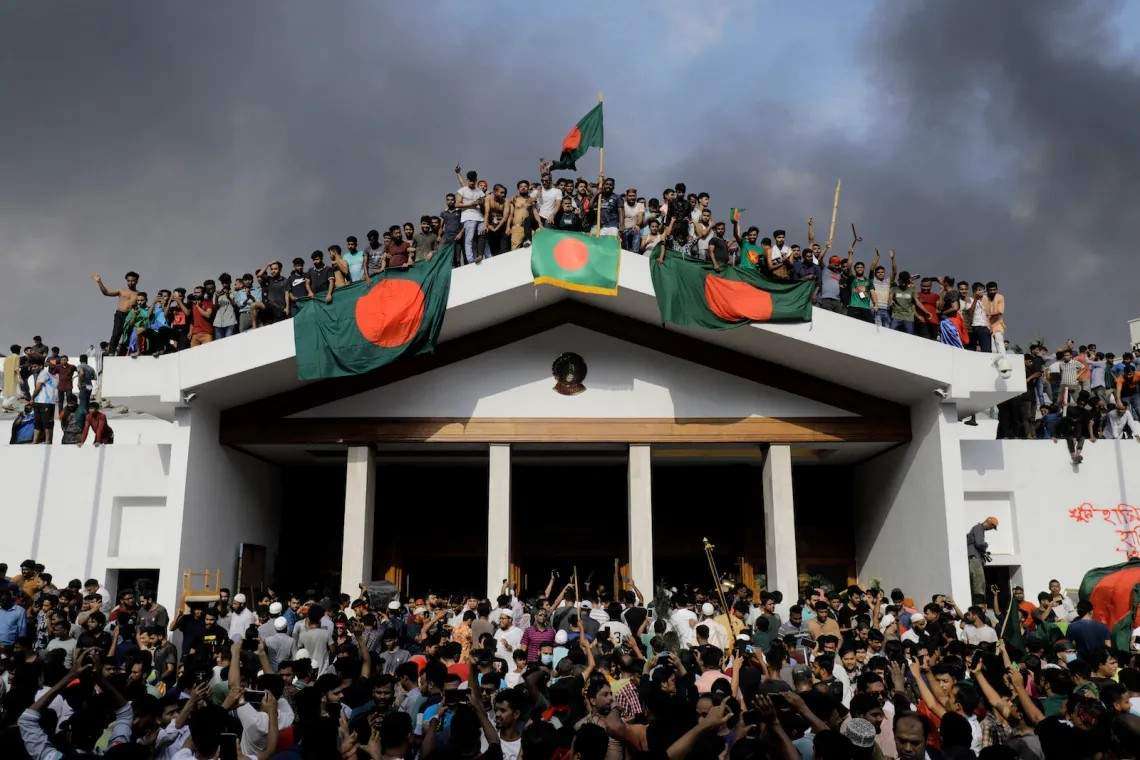Bangladesh, once witnessed as a rising star in South Asia’s economic and political landscape, now finds itself drowning in uncertainty. The country has been left to grapple with the fallout of a sudden regime change took place in August 2024, which not only displaced the government of long-standing Prime Minister of the country Sheik Hasina, but has also destabilized the foundations of Bangladesh’s political and economic systems. As a result, the situation has escalated into a full-scale national crisis which is being characterized by the shutdown of industries, collapse of law and order, and an interim government that is making dubious high-profile reforms rather than urgent government needs, leaving citizens feel betrayed.
The Fall of Sheikh Hasina and the Rise of Interim Regime
Sheikh Hasina had ruled Bangladesh with an iron fist for nearly two decades, years that included periods of economic development and chaos. It all came to a screeching halt on August 5, 2024. After months of unrest, culminating in protests and riots after a bastard reinstatement of a job quota favouring war veterans’ kid, all hell broke loose in the streets of Dhaka. What started as students protesting rapidly escalated into full-blown rioting across the country, much of which observers’ side was further encouraged by the USA extensively supporting them.
Government institutions crumbled under the pressure, and the military refused to intervene for Hasina, thus sealing her fate. On the day of her ousting, the protestors stormed her home. She reportedly fled first by helicopter, then boarded a military aircraft, and eventually landed in India where she currently is in political asylum. Now that the old guard was gone, the military FIR sealed Parliament and appointed Muhammad Yunus; a Nobel Peace Prize recipient, and social business innovator with an interim government head on a pro-term basis; garnering support as well as skepticism from some quarters based on lack of specific experience as a politician, or a perceived Western influence of being informed by his western-based experience however they defined this.
The Human Cost and the Breakdown of Law
The political collapse-generated violence was a epidemic of mob rule. In the year following the collapse, the situation became dire – 637 lynchings were recorded, confirming the absence of law and order and total breakdown of institutional control. Minority communities were targeted, specifically Hindus. Temples were vandalized, people were murdered; in fact, almost 2,200 cases of violence were documented between August and December 2024. Human rights organizations and the UN called for thorough investigations, evidence revealed these unlawful killings, arbitrary detentions and torture, were conducted under Hasina’s government and the Interim government.
Economic Breakdown
The unrest sent instantaneous and strong shocks through Bangladesh’s economy. Billions of dollars were lost as businesses shut down due to uncertainty over the unrest. Inflation surged, with food prices increasing at an astonishing 14%; general inflation was around 11%; and growth forecasts were lowered (World Bank lowered FY2025 growth from 5.7% to 4%). Even though institutions like the IMF and World Bank reaffirmed their support, with certainty in lending assurances, underlying uncertainty remained.
Observers indicate that the closures originate from a toxic brew of bureaucratic procedure, weakened investor confidence, and a supply chain in disarray. Blaming owners for political bias makes for a useful story to distract from the true drivers of these closures – the mismanagement of country’s economy and ongoing instability.
Free and Fair Elections – The Mandate
In the days immediately following the transfer of power, the interim leadership made commitments to restore democratic rule. The mandate for the interim leadership was explicit: conduct free, fair, and inclusive elections and protect the rights and security of all Bangladeshi citizens. However, 12 months later, for many Bangladeshis, there is still no evidence that this promise will be realized.
Though the administration was initially endorsed by the public, mainly because it turned away from the increasing authoritarianism of the Hasina regime, that support has now evaporated. Critics argue that rather than preparing the nation for elections, the government has pursued numerous big and unpopular reforms.
Shift from Electoral Priorities
The interim government has established several commissions, some to amend certain aspects of the Constitution and others to reshape governance and security policies. It has been shocking that many commission chairs are foreign nationals and others with little real expertise on local governance. One such welcome (a foreign-born Bangladeshi now fulfilling the function of the National Security Advisor), incited two prominent hubs of consternation in relation to sovereignty and self-determination i.e. have weakened further a sense of national autonomy, agency, etc.
The government has faced cultural pushback over its proposed establishment of a Women’s Commission, with many seeing its proposed changes as unnecessarily provocative in a conservative Muslim-majority country that is already politically and economically unstable. Rather than uniting people, these commissions are polarizing communities even further – the discussion has moved from preparing for elections to identity politics, foreign influence and institutional overreaching.
Looking Ahead: Elections, Reform, Uncertainty
A year later, the future of Bangladesh remains uncertain. The “July Declaration”, which was supposed to be about reform and a temporary agreement, is stuck without legal enforcement and real political buy in. While political players are signalling potential dates in late 2025 and early 2026 for an electoral timeline, the suspension of Awami League’s registration, along with the focus on the National Citizen Party threatens inclusivity.
On a positive economic front, the World Bank has projected that growth will bounce back to 4.9% in FY26 and then rise to 5.7% in FY27. This is a result of remittances and subsidization of new multilateral budgets. However, continuing insecurity and governance concerns may blunt actual gains.
After more than a decade of Hasina’s rule, Bangladesh now faces governance issues, increasing violence, and tentative reforms under the interim leadership of Muhammad Yunus. With elections approaching, the country must also deal with deep divides to secure democratic renewal or face further fragmentation.
FAQs
1. Why was Sheikh Hasina ousted from power in Bangladesh?
Sheikh Hasina was removed on August 5, 2024, after months of protests and riots sparked by a controversial job quota policy. Political unrest, military non-intervention, and widespread public anger led to her flight to India.
2. Who is leading Bangladesh now?
Nobel Peace Prize laureate Muhammad Yunus heads the interim government, tasked with stabilizing the country and preparing for free and fair elections, though his leadership has drawn both praise and skepticism.
3. What challenges does Bangladesh face ahead of the elections?
The country is grappling with economic slowdown, rising violence, erosion of law and order, political polarization, and concerns about foreign influence over governance reforms.



